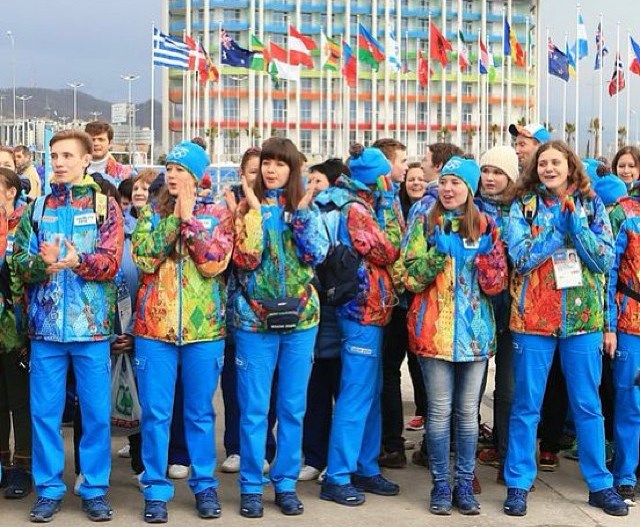Researchers from HSE University Compare Motivations of Volunteers at Winter Olympics in Sochi and Beijing

The Sochi 2014 Olympics volunteer programme involved 25,000 people. It was the first such volunteer project in Russia and was organised with support from the government, educational institutions and non-profit organizations.
In China, volunteering is officially recognised as an important resource for the modernisation of social administration and is controlled by the state. As part of this policy, China plans to attract 27,000 volunteers for the 2022 Olympic Games and 12,000 for the Paralympics.
Marina Sukharkova, Analyst at the HSE Laboratory for Interdisciplinary Studies in Non-Commercial Sector, tried to understand what motivates sports volunteers. She compared the motivations of Russians who volunteered in Sochi and Chinese people who participated in a training course for the Beijing games volunteers. The analysis was based on an online survey that was carried out from April 15 to May 15, 2021. Questionnaires in Russian and Chinese were published in relevant Olympic volunteer groups on social media and specialised forums.

Marina Sukharkova
A total of 385 participants took part: 200 from Russia and 185 from China. The survey used a set of six motivations for sporting event volunteers: the respondents had to choose the ones that were most relevant to them, related to values, education, society, profession, protection or personality.
According to the study, volunteers from China were more often motivated by value and protective reasons, saying that they wanted to take care of others and lessen their feelings of guilt regarding those who need support. 73% of Chinese respondents chose the answer ‘Opportunity to help people’, while 62% chose ‘Opportunity to improve life around me.’ 73% said that social equality was an important reason, and 60% mentioned restoration of social justice.
Russian volunteers seemed less concerned about equality and restoration of justice: these reasons were important to only 23% and 40% respectively. Educational and professional reasons appeared to be more relevant. 50% of volunteers at the Sochi games wanted to gain new knowledge, skills and qualifications, 58% sought interesting work, and 76% wanted professional experience.
Volunteering at the Olympics as a way to meet new cultures was more common among Chinese participants than Russians (cited by 40% of Beijing volunteers vs 27% of Sochi volunteers). The opposite is true for volunteering in order to access information: this reason was chosen by 53% of Russians and 35% of Chinese respondents.
Participants from China mentioned personal reasons for volunteering (such as to improve self-esteem, organize their leisure time, do something they like, etc) more often. 44% of them decided to work at the Games in order to protect their rights. Only 15% of Russians mentioned this reason. More Russian participants said that they saw this as an opportunity to solve some of their problems and travel.
On average, the share of those who preferred social factors (volunteering as a way to improve social relations) was higher among Russians: 66% said it was relevant to meet useful people, 55% said it was a way to make important contacts, and 80% wanted to meet new friends.
‘Social reasons for choosing to become Olympic volunteers appeared to be the most important for everyone,’ Marina Sukharkova concluded. The opportunity to better understand other people was the reason with the most overlap between participants from both countries—it was mentioned by 64% of Chinese volunteers and 61% of Russians.
Marina Sukharkova
See also:
Research Results from HSE University Form Basis of UN Report on Volunteering
The first Regional State of Volunteering in Central Asia Review was presented at the UN Headquarters in New York as part of the annual High-Level Political Forum on Sustainable Development. The preparation of this document included the research conducted by the HSE Centre for Studies of Civil Society and the Nonprofit Sector (CSCSNS), with Viacheslav Ivanov, the Chief Expert of the Centre, serving as the lead author of the review.
‘The African Students Association Believes in Fostering an Inclusive and Diverse Atmosphere’
Russia is becoming an increasingly popular study destination for African students, and HSE University is actively seeking to attract more students from African countries. Bakary S. Sonko, from Gambia, is a master’s student at the Graduate School of Business and an active member of the volunteering community both at HSE University and beyond. In this interview, Bakary recounts his achievements as a volunteer and talks about how African students at HSE have built a supportive and welcoming community for each other.
‘Summer in Russia Has Been the Most Adventurous Holiday in My Life’
Sheripher Dinala, from Malawi, is a student of the Master’s in Political Analysis and Public Policy at HSE University in Moscow. With her busy summer over and the new academic year in full swing, Sheripher shares her stories of moving into a university dormitory, volunteering at international conferences, and nighttime dancing by the Moscow River.
‘Volunteering Is in Every Healthcare Worker’s Blood’
From August 7 to 9, the annual All-Russian Forum of Medical Volunteers took place at HSE University’s Cultural Centre. The event was held for the seventh year in a row. This year, 300 medical volunteers from all over Russia took part.
‘Earth Is Our Only Home; We Must Preserve It’
The Green HSE student organisation recently held the ‘Green Conversation’ festival at the Cultural Centre on Pokrovsky Bulvar. At the event, participants discussed the planet’s main ecological problems and the steps required to start building a green future today.
‘The Club Offers People with Mental Disabilities Something They Lack—Communication’
HSE University is known for its active extracurricular life. There are many student organisations at the university, so everyone can find something for themselves. Anna Lulikyan, fourth-year bachelor student in Sociology, told the HSE News Service about the Best Buddies HSE volunteer club.
Why Volunteers Keep Coming Back
HSE University researchers together with colleagues from Erasmus University in Rotterdam and the University of Pennsylvania examined the determinants of episodic volunteer satisfaction and its impact on the motivation to continue volunteering.
‘We Are Trying to Change Attitudes Towards Homelessness’
HSE University graduates and the Nochlezhka charity organisation have launched a social media project called ‘Gde-to ryadom’ (‘Somewhere Nearby’) about volunteering to help homeless people. The project offers a look at volunteer work from various perspectives through personal stories, expert opinions, and interactive cases.
HSE University Situation Centre Assists Over a Thousand Students
HSE Rector Nikita Anisimov met representatives of the HSE Situation Centre to discuss the results of its volunteers’ efforts. The meeting focused on new forms of support and the problems faced by students.
Charity Festival Held by HSE University
HSE University Student Development Office held its traditional Charity Xmas festival from December 1th to 5th. The event was open to HSE University students, staff and graduates, and anybody else who wished to attend. This year for the first time, it was online, but nonetheless brought together a large number of guests and speakers. The HSE News Service spoke about volunteering and charity in the Coronavirus era.


